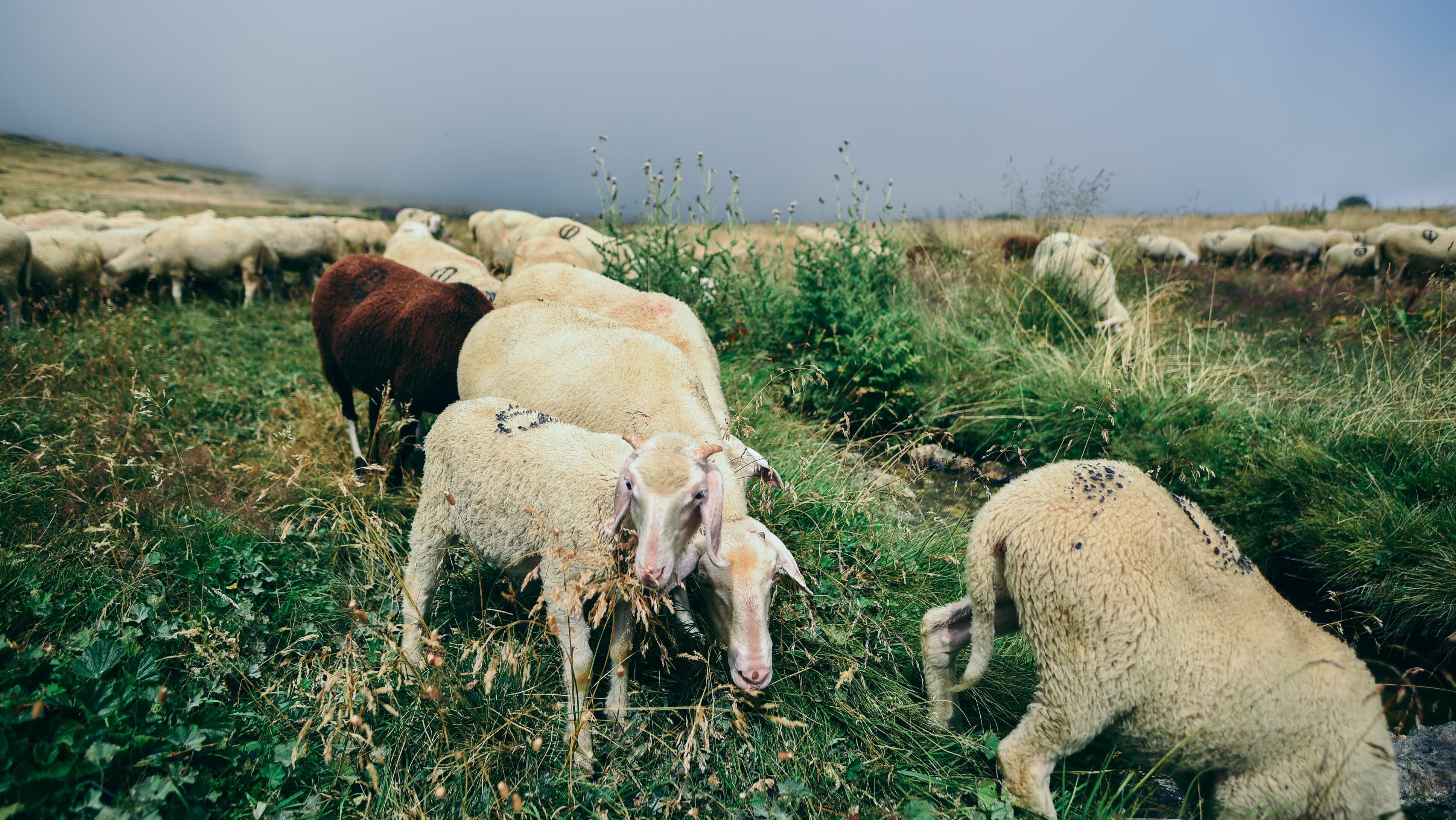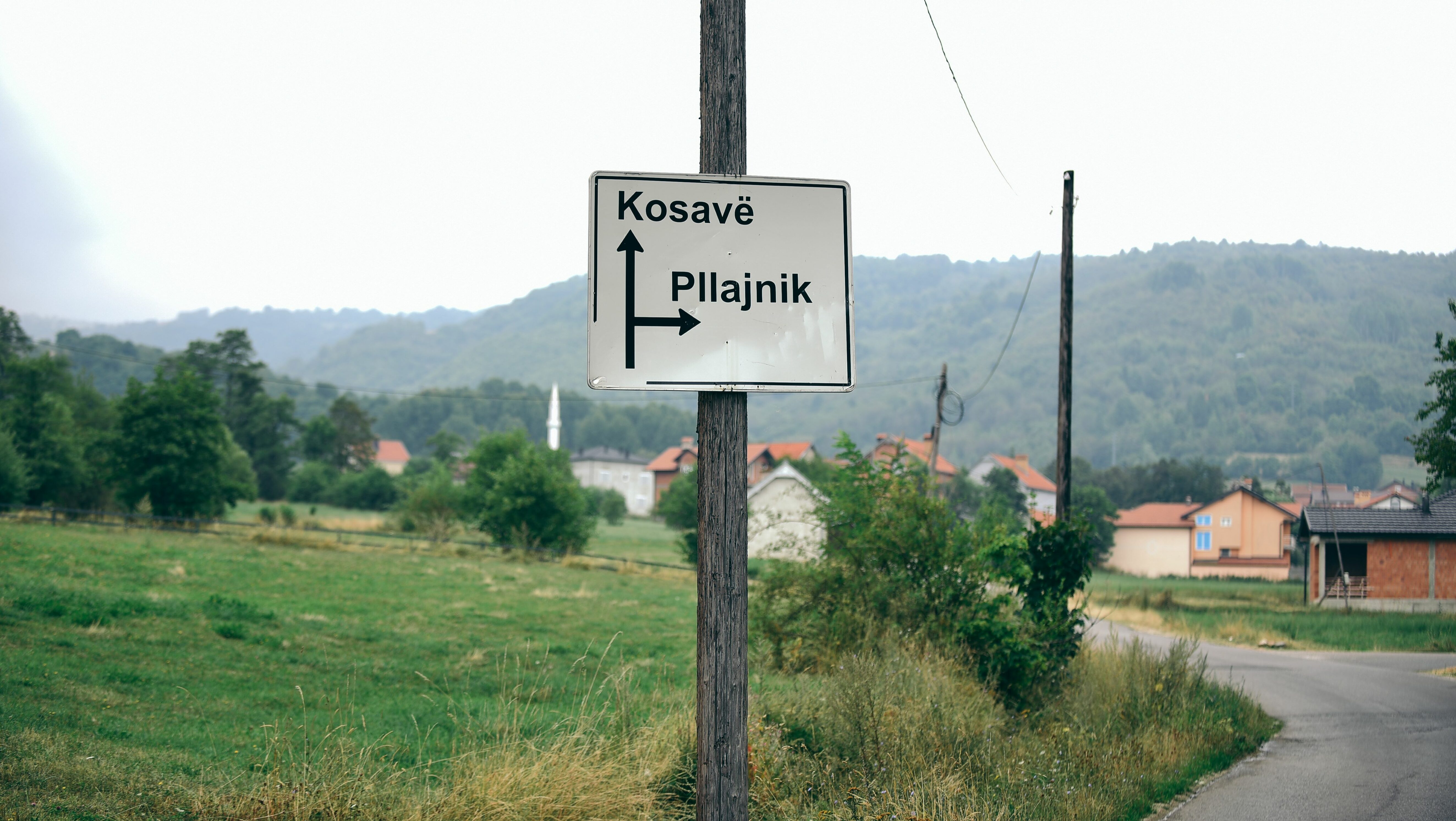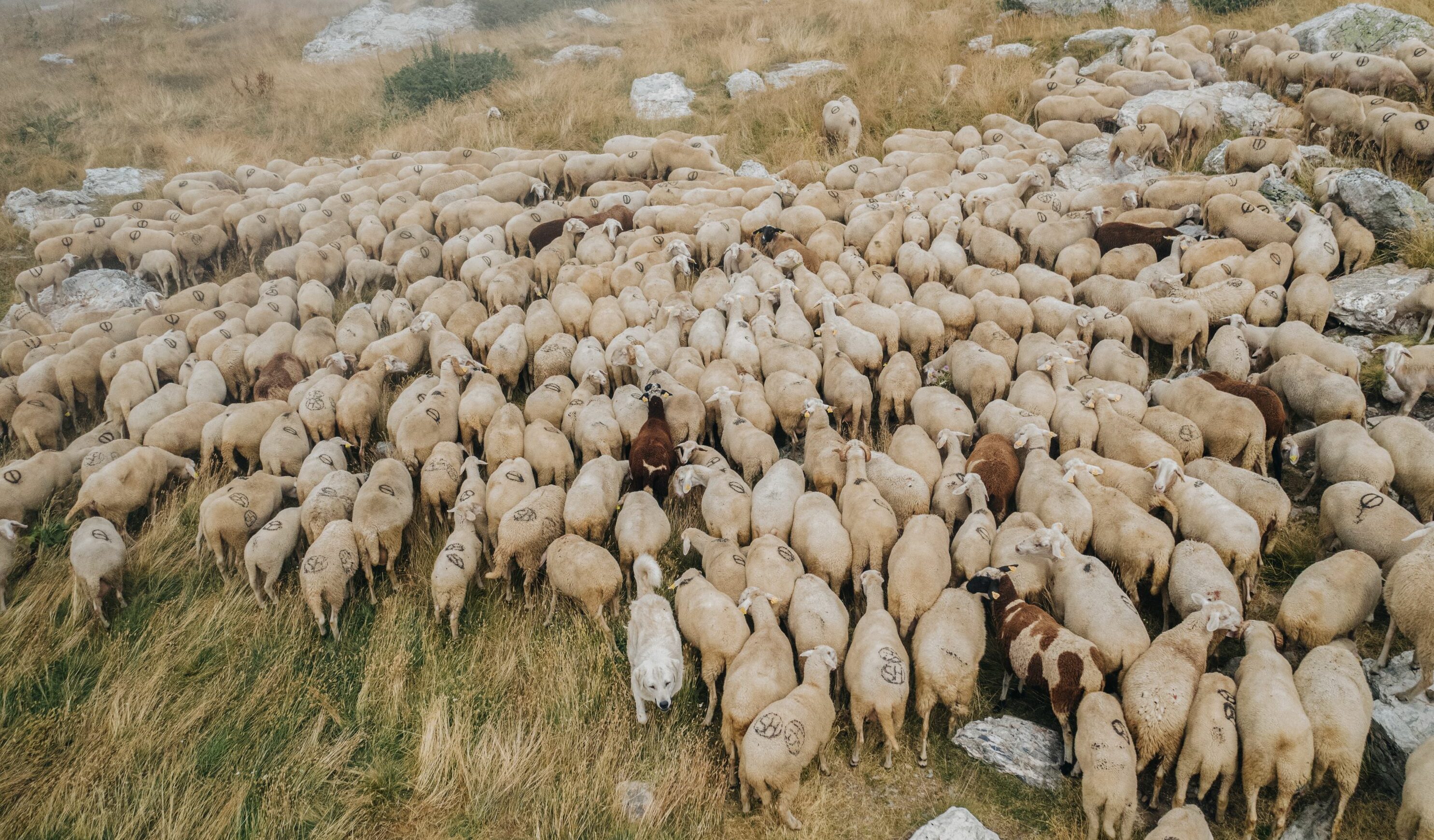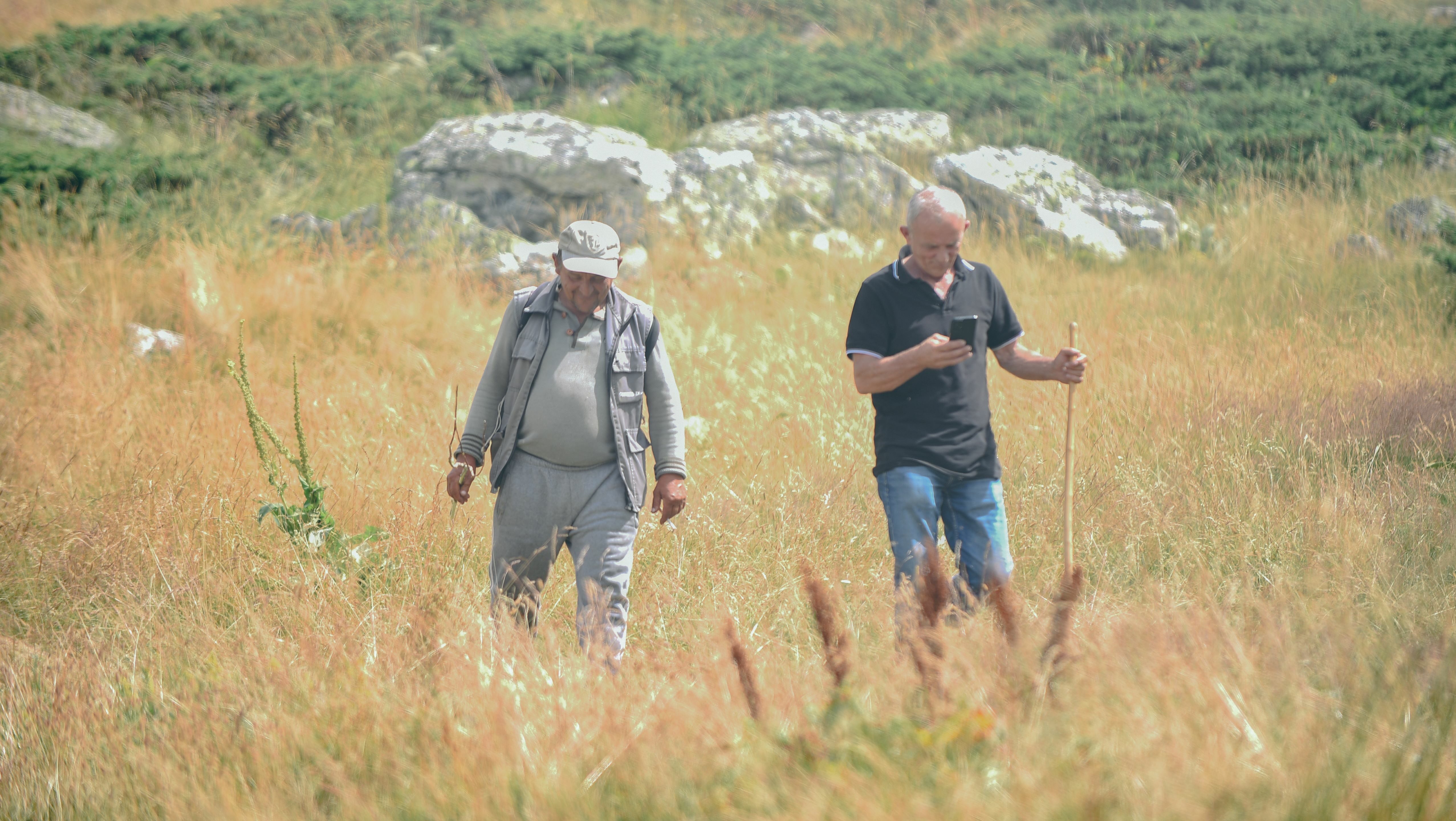Waning interest among the youth to continue the legacy as shepherds is causing a gradual decline in herding activities within the Sharr Mountains.
Emin Kolloni, a 57-year-old shepherd from Kosavë of Opoja, spent his formative years in the Sharr mountains with books in his hands while herding his flock of animals. Motivated by both passion and the pursuit of profit, he embarked on a journey to elevate his herding endeavors.
“Passion and profit made me invest. I bought machines and started processing the cheese,” he said.
High demand for meat and cheese pushed him to exponentially increase the size of his herd, to the point that he and his two brothers now own one of the biggest sheep livestock of the Opoja region, comprising of approximately 1,200 animals in total.

During the transhumance period, the livestock is brought to the highlands to graze. Photo: Denis Sllovinja/Prishtina Insight
As a result, Opoja, a remote region in the southwestern part of the country, nestled amidst breathtaking mountains, stands as one of the last bastions of traditional sheep farming. The inhabitants of this border region, sharing boundaries with Albania and North Macedonia, have faithfully upheld this age-old tradition throughout their lives.
Yet, even this lucrative market is facing decline in the face of modernization, with non-labour-intensive jobs taking its place.
This slow decrease of herding becomes apparent when examining the statistics.
“In the 1980s, the number of sheeps in the Sharr mountains was around 100 thousand. Now there are around 50 thousand” reported Bekim Bytyqi, the administration and finance officer at the Sharr National Park.

In Kosavë, the Kolloni family is the only one still involved in herding and breeding. Photo: Denis Sllovinja/Prishtina Insight
A tradition in danger of disappearing
The village of Kosavë stands as a testament to the unwavering dedication of a single family in preserving a centuries-old culture, driven by their commitment to ancient heritage and sustainable agricultural practices.
However, the Kolloni family does not rely solely on livestock farming for their livelihood. They also engage in modern professions to navigate a changing landscape where traditional farming is gradually fading away. Emin, for instance, holds a concurrent job in a local institution, the Center for Car Registry in Dragash. This allowed him to secure his finances during times when herding faced adversity.
As Emin enters the sixth decade of his life, he continues to carry forward a family tradition deeply rooted in time. His own father, who is now 85 years old, remains a shepherd, as were their ancestors.
“This tradition has been in our family for about 200 years,” Emin proudly shared. But, for the first time, this custom might not survive the generational transition.
His daughter and two sons helped him with herding, since they were children, and still do, whenever they have some free time. But none of them is considering taking over the business, and rather want to focus on their education. The younger one is currently studying medicine in North Macedonia. One of the main reasons he never considered becoming a shepherd himself is because of the stereotypes associated with the profession Farmers in Kosovo often endure stigmatization as primitives.

During the transhumance period, the livestock is brought to the highlands to graze. Photo: Denis Sllovinja/Prishtina Insight
For many youngsters, the allure of urban life and Western countries surpasses any attraction the countryside may hold..
”They would rather prefer simpler lives”, explains Azem, the elder son of Emin, who is pursuing a PhD and has worked as an assistant professor at the University of Prizren and at the Kosovo Statistical Agency.
But this phenomenon does not solely account for the situation. There are several other challenges awaiting aspiring young shepherds entering the field. Azem Kolloni, 33, highlights three key issues.
“First, this region is small, and the population is growing, causing the land to be divided among siblings each year. The second problem is the need for many documents to apply for grants and donations. The lands are not registered in the names of new heir for over 5 generations and therefore cannot be verified. This is one of the difficulties that the ministry needs to address.”
Last but not least, he says, it has become very difficult to find a skilled workforce.
Transhumance remains demanding
This becomes an even bigger concern during the transhumance period, from June to September, when sheeps are moved to the highlands, where the grass is in abundance.
The practice of seasonal herding is very demanding in the higher elevations of the Sharr mountains. In the most remote regions, such as the Gora area in the far south, the pastures are too distant and elevated for daily return trips. Consequently, herders spend the entire season living in the mountains.
“Often, herders form collective groups of two, three or four, pooling their herds together and using distinctive markings for the animals, to identify each animal’s owner. They invest together in a temporary shelter, known as ‘stan’ [in Albanian], or “bacilo” [in Bosnian],” explains Jimmy Balouzat. In 2017, the then French agronomy engineering student spent several months conducting field research in this region, as part of a project that aimed at creating a geographical indication for Sharr cheese, a legal framework for product protection similar to that used in the European Union.

14 dogs are necessary for around 400 sheep. Photo: Denis Sllovinja/Prishtina Insight
Traveling to the transhumance
Near the Opoja plain, transhumance is less of a challenge. Emin Kolloni’s pastures are situated at an elevation of approximately 1700 meters at Bjeshka e Kukit, near the border with North Macedonia. From the small village of Kusave where he lives, it can be reached with a jeep in about ten minutes, following an ascending road that is still under construction, with only a few houses along its side.

Emin Kolloni [on the right], has around 400 sheep and employs two workers to herd them. Photo: Denis Sllovinja/Prishtina Insight
Eventually, we reached the plateau where Emin tends to his herd of around 400 sheep, assisted by 14 dogs. Unlike many other herders, he does not need to rent the land for pastures from the Sharr National Park,which costs around 50 cents per sheep, because the land belongs to the municipality and he obtains it for free.There we met the two employees Emin hired for this year. The first one, Zahadin Mejzini, is a 73-year-old local who has been tending to sheep for nearly as long as he can remember. He wakes up at 5 am and walks for over two hours to bring the herd from the stables to the highlands, where he stays until 7 pm, before making the return journey back to the stable, together with the herd.

Zahadin Mejzini, 73 years old, has been guarding sheeps his whole life”. Photo: Denis Sllovinja/Prishtina Insight
Nothing seems insurmountable for this hardy man: “The mountain has kept me alive. I never get tired, I’ve never been to the doctor, and I’ve never taken medication” he boasts. However, he admits that due to his age, he seriously thinks about retiring.
Emin’s second employee, Emri Sinamati, is a 50-years-old man from a village near Kukës, Albania. Faced with challenges to find a job in his hometown, he spent the past three decades moving to different countries where there is high demand for sheep herders— across Kosovo, but also in Greece and Italy.

Emri Sinamati, from Albania, has worked as a herder in different countries. Photo: Denis Sllovinja/Prishtina Insight
“Herding sheep is not so difficult, it’s also a passion. When things are going well at work, you are satisfied” he sums up as his simple life philosophy.
Employing foreign workers is not a new practice but, with local workers becoming more scarce , shepherds have to go further and further afield to find them. For this season, Azem Kolloni reveals that he even attempted to recruit workers from Bangladesh, “but it was impossible. Visas and transportation were too expensive.”





